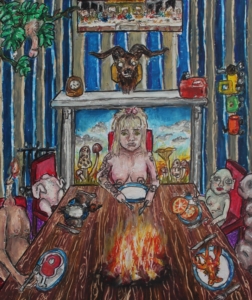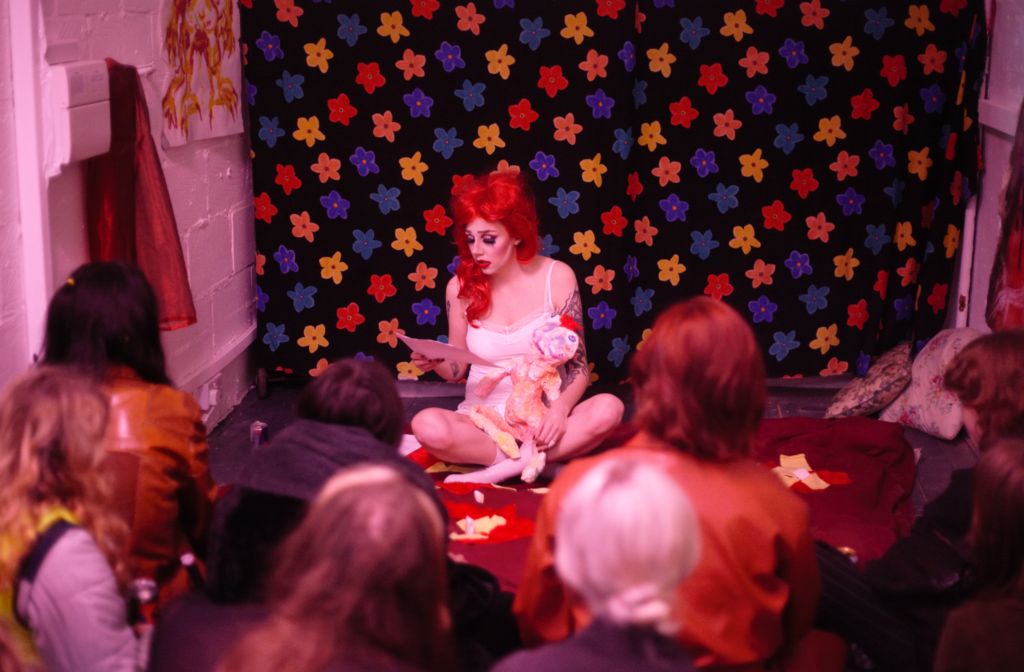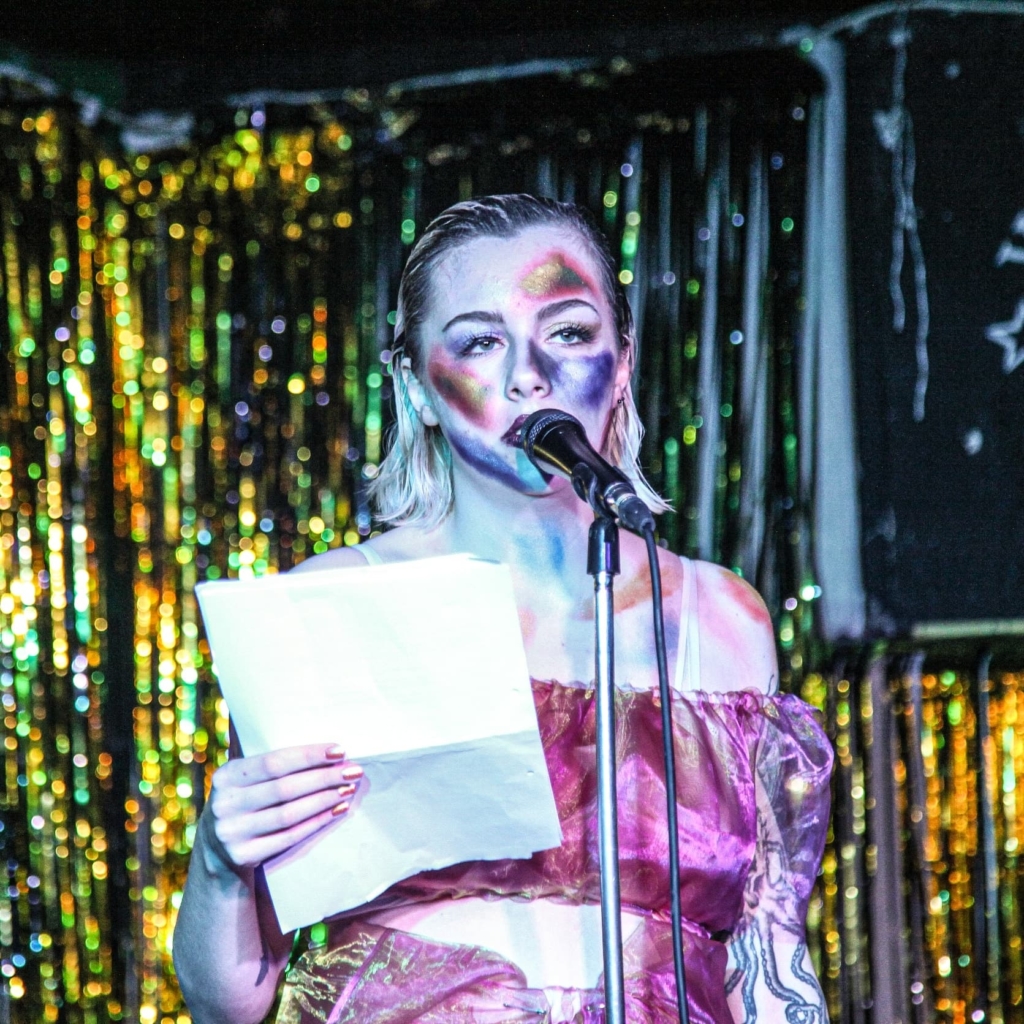POOR MOTHER is a multi-disciplinary artist finishing their first year at the Slade. Their drawings, performances and writing play with ideas of the surreal whilst working with elements of reality. JEAN WATT interviewed them about their practice.
What have you been up to at the moment?
I’ve been trying to keep going with art as normal. I’ve also been making T-shirts which has been fun and feels like more of a hobby. It’s made me think about my drawings a lot more. In terms of reading, I’ve mostly been reading science fiction, which influences my writing. I’ve also been reading a lot about the uncanny as an influence for my work about surreality. It’s almost the opposite [of surreality]. The uncanny kind of shakes your reality and forces you to acknowledge something out of your control but surreality is making you accustomed to weirdness and surreal situations.
What work have you been making?
I started off doing pastel drawings, and then after that I’ve been doing Instagram live performances. They were interesting as it made me think a lot more about my art in terms of video. There was almost a lot more that I could do, despite having to have it in this portrait mode through a phone screen. I think a lot of people found them more intimate than actual performances, because you feel like you’re invading in on someone by watching it on your phone.

What were you doing most recently when you had access to the studio?
I was working towards my seminar [where Slade students present their work], which was supposed to be the week after lockdown happened. I ended up with a collage of what it would have looked like. I had some feedback but it was difficult because the performance ended up as this collage and an audio recording of the text I was going to read.
Could you talk a bit about your practice in general? There seem to be a lot of strands to it – drawing, writing, performance. How do you think they inform each other?
I think they all try to explore similar ideas in different ways. Mostly at the moment I’m looking at concepts that have a surreal nature but then grounding them with familiar objects. I think I can do that sometimes in drawing, through visual elements, and then in my writing it’s more of a mental element as you imagine it yourself. And then performance is a physical experience. I know there’s a big thing around surreal art, and in some ways it’s been done to death. You can kind of only get so weird. I think tying it to reality by using familiar objects or branded things, I found really interesting and is a good niche for me to go down. I’ve sort of abandoned motherhood a bit [much of Luce’s previous work focussed on motherhood]. I’ll probably go back to it, and I think the work will always be a bit about motherhood. Not necessarily being a mother or a baby but more to do with birth in a very conceptual sense.

You’ve spoken about this idea of surreality (the combinations of the surreal and real). It feels kind of relevant at the moment, this dissociation.
Yeah, I think with surreality it’s about making a surreal situation become familiar. Even in performance you can do that, there’s a lot to do with self aware performance, and breaking the fourth wall. If you do that so many times it’s surreal the first time but then you become used to it. I’d been planning to write about it before lockdown happened, and it now seems quite relevant. We’re living in a surreal situation but at this point it’s also daily life too.
What do you feel like performance means to you; how have you used it?
For me, I started off by looking at motherhood as the most ultra-feminine thing I could think of and something that’s quite far from myself. Now, drag is more of a vehicle for exploring things because I’m very comfortable to be performing in drag. The content is informed by myself but the visuals are not myself. And then it’s this interesting element of being looked at, which I thought about [in relation to] John Berger’s writing in Ways of Seeing. What’s really stuck with me is this idea that women navigate through life in a third person perspective and they see themselves through other people’s eyes. I feel like in some ways all my insecurities are around gender and the very visual and physical insecurities around that. Through drag I get to show all those insecurities but exaggerate them. This year, I did a collaborative project with Alvaro Barrington who’s a lecturer at Slade. After one of the shows someone came up to me and said ‘Oh my god, Luce I didn’t recognise you, you look so beautiful’. I think maybe they chose poor phrasing, but also that kind of encapsulates it. It feels very far from myself.
It seems like your work is a process of working something out, what it means to exist in a body. Do you feel like the process of making is as important as what it looks like in the end?
I think that’s the nature of conceptual art, in that the process is often valued more than the final product. I think for me it’s the same thing. In my performances I try to include a lot of the building of the concept, and I think with writing you get that too. Showing the process of an idea you’ve had that is particularly relevant to you.

Do you have any particular writers who inspire you?
Definitely Victoria Sin, their work treads the line between conceptual art and something scientific and detailed. I like Octavia Butler [sci-fi writer] and I think I’ve always been influenced by Bracha Ettinger, who wrote this book called The Matrixial Borderspace. It’s this idea of a psychological space between the mother and child which is both physical and where two people are one. I think I’m just getting it after three years of re-reading it.
Do you think lockdown has changed your way of working?
I think it’s made me more determined to make more work when I can be back in the studio. I think in terms of the way I work, in the Media pathway at Slade my studio was empty a lot of the time so in some ways I’m really used to working by myself. But I would like to have more conversations with people in the studio next year.
You can find Poor Mother on Instagram @poor_mother and on their website, poor-mother.com.





